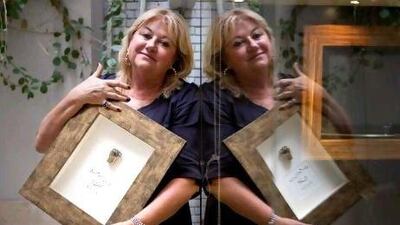Aldyth Oates and Christine Debare were having a life-casting sample framed when they received a helping hand from an unlikely client.
The founders of Heuritier, which makes metal-plated moulds of clients' hands, were approached by someone carrying out an errand for the Royal Court who saw the sample of a baby's hand and decided he wanted one done of the Royal portrait artist.
The person, who was at the shop to frame a Royal portrait, said "that's it, 'I've got to have it'," says the managing partner, Ms Oates.
"R Van Meerbeeck [the Royal portraitist] is 80 years old, so he's got this beautiful hand holding one of his paint brushes which he used to paint Sheikh Zayed [founder of the UAE] and Sheikh Khalifa [President of the UAE] and a lot of the Sheikhs. That was just a lovely hand capture," she says.
At the time, the company, which is believed to be the only one of its kind in the Middle East, was still in the product development phase. Ms Oates says it was a little peculiar to receive a commission before they officially launched the business, but it proved there was an opening in the market.
She and Ms Debare started out with a target group last year: Emirati women, and set about looking for something missing in the market.
"This was a very obvious gap," says Ms Oates, who knew of a company similar to Heuritier in South Africa. That company trained Ms Oates and Ms Debare and shared its business model with them.
"The difference was that [it] was very much a mass market or mid-market, whereas here our target is a lot more upmarket," says Ms Oates.
"The [South African company] had never thought of gold plating. Theirs was very much a brass and nickel market. We do nickel, brass, copper, gold and [solid] silver."
The process involves taking a silicone mould, which takes about three minutes to set. Once the client takes his or her hands from the mould, another silicone is poured into the resulting space. The cast is then removed and plated in metal. Heuritier always take two moulds in case something goes wrong with one.
"[The mould] starts as a liquid and sets as a soft jelly, so you get every single detail of a person's hand," says Ms Oates.
Prices start at Dh10,000 (US$2,722) and go up to Dh50,000 and beyond, depending on the size, weight and the type of metal used. Plating is the only process the company outsources.
"It's not electroplating, which is the common way of plating metal on metal. When it's not a metal it's really quite complex and difficult," says Ms Oates.
"We have decided that by June if we have built up enough volume, we will open our own factory to do the non-conductive plating, which is what it is called. We would very much like to do that," she adds.
The company also offers moulds of babies' feet. And as both women have been based in the Middle East for years, Ms Oates and Ms Debare were well aware of the sensitivities surrounding feet in Islam.
"When we did our initial research with locals and expat Arabs, one member of the focus group picked up the model of the baby's foot and said 'We kiss babies' feet,'" says Ms Oates.
Initially intending to concentrate on babies' hands and feet, the commission of the Royal portraitist opened up another market for them.
"Then we did a historian who is UAE-based and has done a lot of books about the UAE, and a calligrapher, and somehow the 'big hands' as we call them took on a life of their own," she adds.
twitter: Follow our breaking business news and retweet to your followers. Follow us


